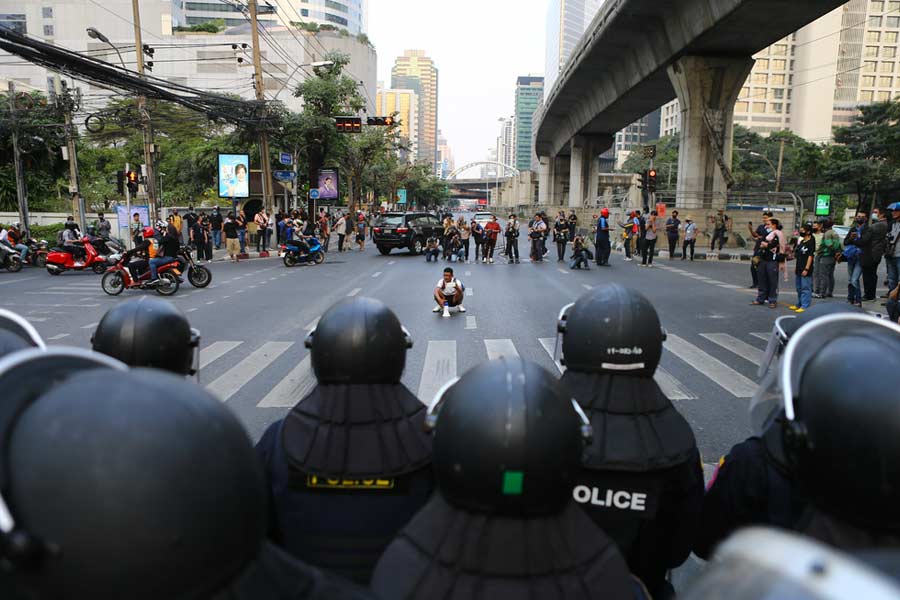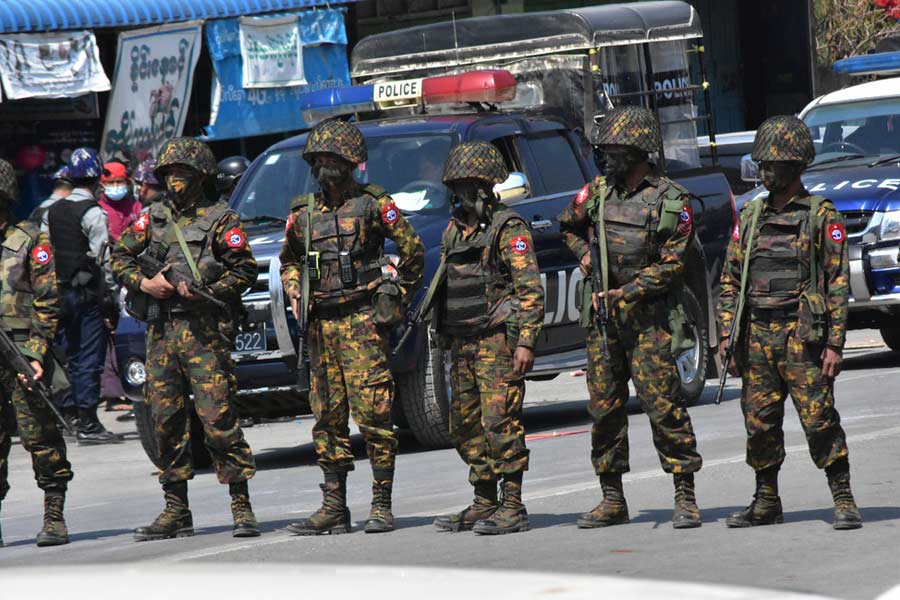Myanmar’s rebel groups have joined forces, inflicting one defeat after another on the Myanmar army in different parts of the country and seizing tanks, rocket launchers and other arms and ammunition. The rebels’ rapid advances have left the junta struggling to mount a counteroffensive as outnumbered regime soldiers abandon military outposts and surrender.
Most crucially, the rebels have seized towns in Myanmar’s crucial northern Shan State and severed overland trade routes to China. “The situation is unprecedented. The mighty Myanmar war machine is on the retreat,” says Pratap Heblikar, former special secretary, Government of India.
Three key ethnic rebel groups active in Shan State have spearheaded what’s dubbed Operation 1027 – the date they began their surprise joint offensive against the regime. That’s left the army in a fix as it’s unable to tackle the multiple battlefield challenges it’s facing in different provinces. “The Three Brotherhood Alliance,” as it’s called, is backed by many smaller resistance outfits.
It’s too soon to say whether the rebels’ coordinated offensive could bring down the junta. But “they represent the biggest battlefield challenge to the military since its February 2021 coup,” says Richard Horsey, senior adviser at the International Crisis Group, an independent analysis organisation. Army general Min Aung Hlaing seized power in the 2021 coup, ousting the elected government and plunging the country into a civil war that’s left thousands of people dead.
Following up on their successes in Shan State, the rebels launched an assault in Rakhine State, in the west on November 13. The operation has proceeded rapidly, with regime forces surrendering scores of military bases, according to the rebels. The military has launched airstrikes against the rebels but has been unable to counter Operation 1027 and rebels have been ambushing reinforcements sent by the military.
The string of defeats in Shan province has halted Myanmar’s land trade with China. “Billions of dollars' worth of business is transacted legally and illegally. The closure of the borders is hurting Chinese business interests,” says Heblikar.
200,000 civilians displaced
The UN estimates about 60,000 civilians have been displaced by the fighting in Shan province alone and 200,000 nationwide, bringing the total number of civilians displaced since the coup to over two million.

Shutterstock
India felt the impact of the fighting last week when some 73 Myanmar soldiers and police crossed from Chin State into neighbouring Mizoram after losing battles with the rebel forces. Myanmar air force planes have also laid waste to several villages in Chin State with the result that as many as 5,000 civilians have fled to Mizoram and are living in refugee camps there. The Myanmar troops were handed over to their government at a different point in the border.
A Myanmar government spokesperson said Friday fighting was taking place in Shan, Rakhine and Kayah states. There are also clashes in Chin and close to Myanmar’s second-largest city, Mandalay. Chin and Kachin State, where there’s fighting too, have borders with India. Tanks are out in Sittwe, the main city in Rakhine province where India has developed a deepwater port.
For Myanmar’s rulers, the situation is particularly difficult now because the majority Bamar community, which makes up 70 per cent of the population, has also turned against the government in a big way. In earlier years, it was always the smaller ethnic communities like the Chins and Karens who opposed the government. Says Heblikar: “The Bamar community, which was hitherto unaffected, has also gone into the vortex of the fight against the military.”
'Existential crisis'
The army-installed president, Myint Swe, told the state National Defence and Security Council that the country is facing an “existential” crisis and could splinter if it cannot crush the rebel offensive, according to state media.This stark analysis is shared by some senior Indian diplomats who have served in the region.
Announcing its offensive, the alliance said in addition to its strategic objectives, it was committed to “eradicating the oppressive military dictatorship, a shared aspiration of the entire Myanmar populace”. The announcement may be more “for rhetorical than substantive effect,” notes Horsey, as the ethnic armed groups have been more focused in the past on goals of autonomy and control of lucrative resources. Still, the alliance’s salvo at the junta has fired hopes among the anti-regime movement that the rebels might succeed in toppling the regime.
The Three Brotherhood Alliance includes the Myanmar National Democratic Alliance Army (MNDAA) and the Ta’ang National Liberation Army (TNLA) which have long aimed to establish control over different parts of Shan State. The third partner, the Arakan Army (AA), is active mainly in Rakhine State. One estimate is the rebels have captured over 100 military posts. Aside from the alliance, other ethnic groups have gone on the offensive against the military.
Bad miscalculation
What’s gone wrong for the junta since 2021? Quite simply, the military, which was used to running the country in its own vicious way, miscalculated badly when it toppled the civilian government. The army had ceded total authority in 2010 and the population had become accustomed to a freer political climate. Also, the Internet was used by around 85 per cent of the population by 2020, up from some 4 per cent in 2010.
“The military was grossly underestimating the opposition. Ten years of quasi-democracy in the country had changed the outlook of the people. They had enjoyed considerable freedom under the Aung Sang Suu Kyi government,” said a security expert.
The army dived into this cauldron thinking it could control the civilian populace and put down any resistance brutally as it had done in the past. But from the start, the civilians revolted against the military regime with nationwide demonstrations and riots.
Deepening rift in army
There are now reports about deepening rifts in the army and weak troop morale. In the last few weeks, several three-star generals have been removed from their posts. At a lower level, large-scale desertions are taking place. Several younger officers are also thought to have nursed ambitions of entering parliament using the 25 per cent quota reserved for the armed forces in the constitution. They’re now extremely unhappy with the current situation where they’re fighting and often losing battles with the rebels.
“People's anger (over the coup) has not subsided and whatever the military wanted to do is not going to be achievable,” says the security expert. “People are now totally against any form of military rule and want the government to be rule-based and respect the constitution.”
Some analysts suggest the army may now attempt to ease out its most hardline players and seek to show a kinder face to the public. Where this would leave junta leader Min Aung Hlaing remains to be seen. Says one analyst: “As I see it, the military will throw out the present strong man and bring in somebody who they hope will be acceptable to the general public.”
The military is going to be fearful of relinquishing power as that would leave them in a vulnerable position. Their worry is that “a majority of them would end up behind the bars, the army would be reduced to the barracks,” the analyst said.
Tacit nod from Beijing
Some analysts say Beijing may have given a tacit nod to the rebel uprising in return for the insurgents' pledging to crack down on global online scam gangs that have trafficked thousands of Chinese into semi-slavery.
“Without the ability to paint Operation 1027 as an effort to serve Chinese interests in curbing the criminal gangs, the anti-junta forces would have risked strong Chinese disapproval," the United States Institute of Peace says in a report. “Tacit Chinese support was therefore essential to the operation’s success,” it says.
Beijing has publicly called for a halt to the fighting. But “for the most part it appears to be waiting to see how events play out. This approach stems partly from its hope that the alliance will help rein in online scam centres,” says Horsey.
'Deeply concerned'
Where does India stand in all this? Foreign Ministry spokesperson Arindam Bagchi said Thursday that New Delhi is “deeply concerned.” India’s prime aim is to ensure that China does not get a stranglehold on the country and also to stem refugee flows. “India’s interests in Myanmar are security-centric. Excessive Chinese influence in Myanmar is detrimental to our interests, given the CCP’s proximity to Indian insurgent groups,” says Heblikar.
China has a lot riding on the stability of its border with Myanmar if it wants to press ahead with its stumbling Belt and Road initiative. Also border stability is key to maintaining overland trade that represents at least 12 per cent of official Chinese-Myanmar trade. By contrast, India’s border trade with Myanmar is estimated at less than one per cent of overall bilateral trade. India had viewed Myanmar as a gateway that could facilitate trade with Asean. However, Bangladesh appears to have become India’s pathway to the Indo-Pacific.
Indian, the US, which is also keen to see Myanmar doesn't fall under China's complete sway, and Myanmar troops are slated to hold military exercises in Meghalaya’s Umroi Cantonment in a few days and it’s seen as an opportunity for the three countries to swap views. “While the troops exercise in the field, the powerbrokers will exchange notes,” said an analyst.
Military staying power
It’s hard to say how the fast-moving situation will play out. Much may hinge depend on whether the thinly stretched military can regain or deter its opponents with air attacks. The military’s “staying power should not be underestimated. Nor should the regime’s resolve to fight on at all costs,” says Horsey. It’s also a well-trained force “which has been continuously battling various insurgencies since World War II.”
“While anti-junta forces are understandably enthusiastic following the dramatic early successes of Operation 1027, military collapse or regime capitulation seem far off,” Horsey says. “More likely is that the regime will double down on brutal efforts to gain the upper hand on the battlefield, including scorched-earth tactics and indiscriminate bombing and shelling.” The result could be even more violence with Myanmar’s citizens paying a heavy price.
There’s also the possibility China would be uncomfortable if the resistance movement, which Beijing sees as Western-leaning, gains too much momentum and so it might move to bolster the junta, Horsey suggests.
The National Unity Government, formed in exile following the coup, is regarded by China as being in the West's pocket.










